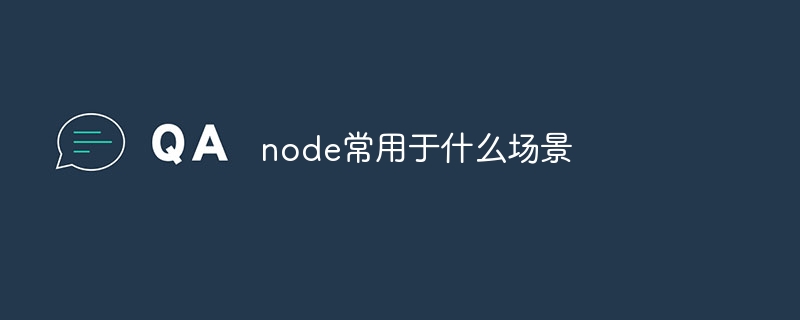What scenarios are node commonly used in?

Node.js has a wide range of applications in many different scenarios. The following are some commonly used scenarios for Node.js:
Server-side development: Node.js’s high performance and event-driven non-blocking I/O model make it ideal for building server-side applications. program. It can be used to develop web applications, API services, real-time communication servers, microservices, etc.
Web application development: Node.js can be used to build various types of web applications, including single-page applications (SPA), multi-page applications, blogs, forums, etc. By using frameworks such as Express, Koa, and Nest.js, you can quickly build feature-rich web applications.
Real-time applications: Node.js is suitable for building real-time applications such as chat applications, real-time collaboration tools, multiplayer games, etc. With the help of technologies such as Socket.IO and WebSocket, real-time data transmission and two-way communication can be achieved.
Command line tool development: Node.js provides powerful file system operations and command line interfaces, making it an ideal choice for developing command line tools and scripts. By writing scripts, you can automate tasks, perform data processing and analysis, and more.
Data stream processing: Node.js supports efficient data stream processing through the concept of stream. It can be used for scenarios such as processing large files, log analysis, data import and export, etc.
RESTful API development: With frameworks such as Express, Hapi, Fastify, etc., Node.js can easily build flexible RESTful APIs for data interaction with front-end applications or mobile applications.
Microservice architecture: The lightweight and highly scalable nature of Node.js makes it the first choice for building a microservice architecture. By splitting different functional modules into independent services, a loosely coupled system architecture can be achieved.
Development tools and automated builds: Node.js can be used as a build tool and task runner for development work such as automated builds, code compression, testing and deployment.
IoT application development: The lightweight and low-power nature of Node.js makes it suitable for the development of Internet of Things (IoT) applications. It can be used to control sensors, collect device data, communicate with IoT platforms, and more.
Please note that these are just some common usage scenarios. Node.js is widely used and flexible, and can be extended and customized according to specific needs.
The above is the detailed content of What scenarios are node commonly used in?. For more information, please follow other related articles on the PHP Chinese website!

Hot AI Tools

Undresser.AI Undress
AI-powered app for creating realistic nude photos

AI Clothes Remover
Online AI tool for removing clothes from photos.

Undress AI Tool
Undress images for free

Clothoff.io
AI clothes remover

Video Face Swap
Swap faces in any video effortlessly with our completely free AI face swap tool!

Hot Article

Hot Tools

Notepad++7.3.1
Easy-to-use and free code editor

SublimeText3 Chinese version
Chinese version, very easy to use

Zend Studio 13.0.1
Powerful PHP integrated development environment

Dreamweaver CS6
Visual web development tools

SublimeText3 Mac version
God-level code editing software (SublimeText3)

Hot Topics
 1386
1386
 52
52


